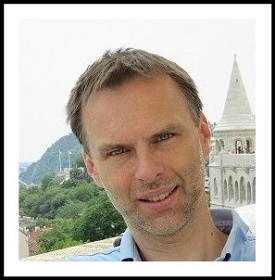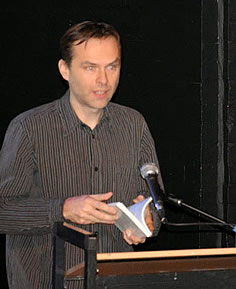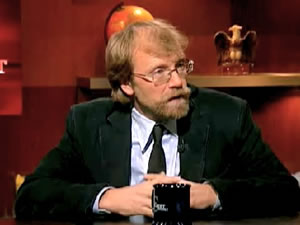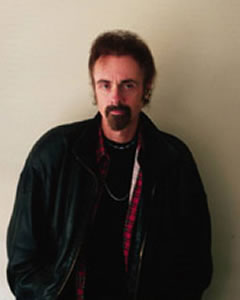De Vlaamse dichter Frédéric Leroy werd geboren op 2 december 1974 in Blankenberge. Zie ook alle tags voor Frédéric Leroy op dit blog.
Snaartheorie
De dag
is een kluwen en de uren
groeien in (en uit) mijn vlees
als hechtingsdraadjes rond
een open wonde
het lijkt alsof iemand bang is
dat ik hier en nu uiteen zou vallen
in nietszeggende deeltjes, lafhartige
stukjes die door het onbewaakte oog
van de naald willen kruipen, dat ik
toch de dans ontspringen zou.
Mijn vingers zijn vezelachtig
als afgekloven klokhuizen.
En waarom? Maar daarom! En wat?
En wee als ik in dit spel niet langer
de marionet wens te zijn,
niet ingepakt wil worden
als een vlieg in spinnenrag,
want dan zwaait er wat, zwaait
er wat.
Lied van vermiste kinderen
Een zonbeschenen plein. U heeft mij niet
begrepen. Nog eens: een zonbeschenen plein,
veel stof en voor wie het horen wil: een lied
dat zichzelf bezingt. Bomen. Geen fontein.
Dit is het plein, zonbeschenen en niet
voorzien van een fontein. Wel: het zingen
van vermiste kinderen. Maar dit is geen lied
dat in stilte ook de stilte kan bedwingen.
Ik besluit: een plein. Wijds en zonbeschenen,
veel stof en een onthutsend gebrek aan fontein.
Bomen. Een drietal. En kinderen die, verdwenen,
ontbeend, enkel het lied van een lied kunnen zijn.
Zo ook dit gedicht: een zonbeschenen plein,
het zingen en het zingend afwezig zijn.
Kamer zonder uitzicht
De slager naast Brazil zegt het al langer,
dus houdt het kort: “ik doe niet aan halal,
maar zo’n zwijnerij, geen rattenvanger
die daaraan wil beginnen”. De augiasstal
lokt nochtans “de meest voorname heren”,
verklaart ook mevrouw G., die de namen
bijhoudt. Niet dat ze zomaar wil beweren
het fi jne van de zaak te weten. De eenzame,
misogame dame heeft ze bovendien
niet op rij: “in de kampernoeliekwekerij,
meneer sjampetter, daar ligt onze Kristien,
het arme meisje, er stokstijfstilletjes bij”.
Hotel Brazil, waar de dag de vieze sokken
uittrekt, honger stilt met hondenbrokken.

Frédéric Leroy (Blankenberge, 2 december 1974)
De Amerikaanse schrijfster Ann Patchett werd geboren in Los Angeles op 2 december 1963. Zie ook alle tags voor Ann Patchett op dit blog.
Uit:Truth and Beauty
“We knew things about Lucy the way one knows things about the private lives of movie stars, by a kind of osmosis of information. I do not remember asking or being told. It was simply passed through the air. Not only did we know about Lucy’s childhood, her cancer, her bravery, everyone in school knew that Lucy was the poet. Better than a very good college poet, she was considered by both teachers and hipsters to be a serious talent. She was always picked to give readings in the coffee shop on Parents’ Weekend. People pressed into the little room to listen, her voice as small as it was when she directed us to the emergency exits on Friday nights, but more self-confident.
“When I dream of fire,” she read, “you’re still the one I’d save / though I’ve come to think of myself / as the flames, the splintering rafters.”
As I sat in the audience, watching, I believed we had something in common even though I wrote short stories. People liked my work but had trouble remembering me. I was often confused with another writer named Anne who was in one of my classes, and with a girl named Corinna who lived downstairs from me. Unlike Lucy, I had a tendency to blur into other people. I had come to Sarah Lawrence from twelve years of Catholic school where we were not in the business of discovering our individuality. We dressed in identical plaid skirts, white blouses, saddle oxfords, and when we prayed, it was together and aloud. It was impossible to distinguish your voice from the crowd. There is an art to giving yourself over to someone else and as a group we mastered it. While Lucy had discovered that she was different from all the other children in her grade school because she was sick and was different from all the other children on the hospital’s cancer ward because she continued to survive, I had discovered I was so much like every other little girl in the world that it always took me a minute to identify my own face in our class photo. Still, I thought, in my shyness, my blurriness, it would not be so unreasonable to think that the famous Lucy Grealy and I could be friends. But when I waved to her in passing or said hello in the cafeteria, she would look at me blankly for a minute and then turn away as if we had never met. Once I stopped her at the window where we returned our trays and dirty dishes.
“My father and stepmother live in Los Angeles,” I said. “They invited a couple of the midshipmen from the Naval Academy over for Thanksgiving dinner and it turns out one of them went to high school with you. His name was Bobby something.”
She stared at me as if she could not possibly imagine why I was speaking to her. I made another stab at my story. “I guess Sarah Lawrence came up and they figured out we both went there, so he asked my parents to ask me to tell you hello.” I gave her a little smile but it went nowhere. “So, hello.”

Ann Patchett (Los Angeles, 2 december 1963)
De Nederlandse dichter en schrijver Hein (Hendrik Jan) Boeken werd geboren in Amsterdam op 2 december 1861. Zie ook alle tags voor Hein Boeken op dit blog.
Geloven
Wanneer ik nu in de oude bladen lees
En zie het wonder beeld-werk van die tijden,
Die nog voor ’t heil-begerig oog belijden
Een geloven, dat hoog boven werelds vrees
En hel en dood en wat het meeste dees
Tijden onteert: kil onverschillig lijden
Van weedom, hief tot ’t hoogste heil verbeiden,
Des dervend nu doolt menig hart als wees;
Dan voel ik in wie nu dichtste bij mij woont
Al schijnt ook de aard van heiligheid verlaten
En ’t schoonst verjaagd door ongeloof verwaten,
Dat toch de God, die in het diepst hart woont,
Nog niet verscheidde en licht me in ziele-pracht
Een eenzaam wacht-vuur, rondom donkre nacht.
O durige eredienst
O durige eredienst van kleine plichten
Gepleegd naar ’t levend voorschrift van de drang
Van mijn verlangend hart, waar dag niet lang
Nacht veel te kort voor valt, kon ‘k in ’t verrichten
Op dat denkbeeldig altaar, waar als lichten
Uwe ogen zijn, mijn zielsnood stijgt als zang
Van al onzichtbre koren en uw wang
En heilge slaap veel heilige gezichten
Vervangt en dierder onder ’t welfsel staat
Van mijn vervulde ziel dan in een kerk
Van stenen bouw al’ kostbaarst kerksieraad
Maken elk daadje tot zo’n innig werk
Dat wat nu, ach, is schijn van vluchtige uren
Een hemel werd, die de eeuwen kon verduren.
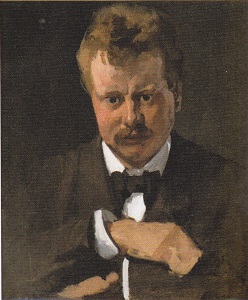
Hein Boeken (2 december 1861 – 19 oktober 1933)
Portret door Willem Witsen, ca. 1892
De Amerikaanse schrijver Thomas Coraghessan Boyle werd geboren op 2 december 1948 in Peekskill, New York. Zie ook alle tags voor T. C. Boyle op dit blog.
Uit: The human Fly (The Love Of My Life)
“They wore each other like a pair of socks. He was at her house, she was at his. Everywhere they went—to the mall, to the game, to movies and shops and the classes that structured their days like a new kind of chronology—their fingers were entwined, their shoulders touching, their hips joined in the slow triumphant sashay of love. He drove her car, slept on the couch in the family room at her parents’ house, played tennis and watched football with her father on the big thirty-six-inch TV in the kitchen. She went shopping with his mother and hers, a triumvirate of tastes, and she would have played tennis with his father, if it came to it, but his father was dead. “I love you,” he told her, because he did, because there was no feeling like this, no triumph, no high—it was like being immortal and unconquerable, like floating. And a hundred times a day she said it too: “I love you. I love you.”
They were together at his house one night when the rain froze on the streets and sheathed the trees in glass. It was her idea to take a walk and feel it in their hair and on the glistening shoulders of their parkas, an otherworldly drumming of pellets flung down out of the troposphere, alien and familiar at the same time, and they glided the length of the front walk and watched the way the power lines bellied and swayed. He built a fire when they got back, while she toweled her hair and made hot chocolate laced with Jack Daniel’s. They’d rented a pair of slasher movies for the ritualized comfort of them—“Teens have sex,” he said, “and then they pay for it in body parts”—and the maniac had just climbed out of the heating vent with a meat hook dangling from the recesses of his empty sleeve, when the phone rang.
It was his mother, calling from the hotel room in Boston where she was curled up—shacked up?—for the weekend with the man she’d been dating. He tried to picture her, but he couldn’t. He even closed his eyes a minute, to concentrate, but there was nothing there. Was everything all right? she wanted to know. With the storm and all? No, it hadn’t hit Boston yet, but she saw on the weather channel that it was on its way. Two seconds after he hung up—before she could even hit the START button on the VCR—the phone rang again, and this time it was her mother. Her mother had been drinking. She was calling from a restaurant, and China could hear a clamor of voices in the background. “Just stay put,” her mother shouted into the phone. “The streets are like a skating rink. Don’t you even think of getting in that car.”
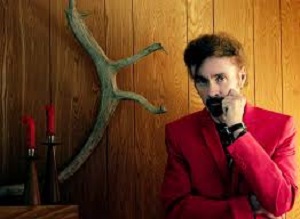
T. C. Boyle (Peekskill, 2 december 1948)
De Amerikaanse schrijver George Saunders werd geboren op 2 december 1958 in Chicago. Zie ook alle tags voor George Saunders op dit blog.
Uit: Lincoln in the Bardo
“Mouth at the worm’s ear, Father said:
We have loved each other well, dear Willie, but now, for reasons we cannot understand, that bond has been broken. But our bond can never be broken. As long as I live, you will always be with me, child.
Then let out a sob
Dear Father crying That was hard to see And no matter how I patted & kissed & made to console, it did no
You were a joy, he said. Please know that. Know that you were a joy. To us. Every minute, every season, you were a—you did a good job. A good job of being a pleasure to know.
Saying all this to the worm! How I wished him to say it to me And to feel his eyes on me So I thought, all right, by Jim, I will get him to see me And in I went It was no bother at all Say, it felt all right Like I somewhat belonged in
In there, held so tight, I was now partly also in Father
And could know exactly what he was
Could feel the way his long legs lay How it is to have a beard Taste coffee in the mouth and, though not thinking in words exactly, knew that the feel of him in my arms has done me good. It has. Is this wrong? Unholy? No, no, he is mine, he is ours, and therefore I must be, in that sense, a god in this; where he is concerned I may decide what is best. And I believe this has done me good. I remember him. Again. Who he was. I had forgotten some- what already. But here: his exact proportions, his suit smelling of him still, his forelock between my fingers, the heft of him familiar from when he would fall asleep in the parlor and I would carry him up to—
It has done me good.
I believe it has.
It is secret. A bit of secret weakness, that shores me up; in shoring me up, it makes it more likely that I shall do my duty in other matters; it hastens the end of this period of weakness; it harms no one; therefore, it is not wrong, and I shall take away from here this resolve: I may return as often as I like, telling no one, accepting whatever help it may bring me, until it helps me no more.”

George Saunders (Chicago, 2 december 1958)
Chicago in de adventstijd
De Duitse schrijver Botho Strauß werd geboren op 2 december 1944 in Naumburg an der Saale. Zie ook alle tags voor Botho Strauß op dit blog.
Uit: Drüben
„Hier hat sie sich ein Zimmer ausgesucht, schon vorsorglich einen Platz reserviert, für später einmal. Sie meint, von dort werde sie dann – später einmal! – auf das Haus hinübersehen, in dem sie mehr als ihr halbes Leben zugebracht hat, auf die Fenster der vierten Etage zurückblicken, in der sie mit ihrer Mutter, ihrem Mann, den aufwachsenden Kindern so lange gewohnt hat. Sie würde sich auch bemühen, die Menschen, die nach ihr dort einzögen, kennen zu lernen und einen Kontakt zu ihnen zu finden. Aber das hat alles noch eine Weile Zeit. Später einmal, wenn sie die Treppen nicht mehr wird steigen können. Drüben gibt es einen Aufzug.
Sie sind jetzt über eine Stunde zu spät. Die alte Frau kann sich nicht mehr in Geduld fassen. Es könnte ihnen schließlich etwas zugestoßen sein. So weit ist der Weg doch nicht, selbst bei zähem Verkehr, sie müssten längst hier sein.
Aber sie haben sich gar nicht auf den Weg gemacht zu ihr. Die Tochter und ihr Mann haben die Einladung bei der Mutter einfach vergessen. Sie sind unter Mittag ein Stück ins Land hinausgefahren, haben Freunde besucht und sitzen nun zusammen in einem Gartenrestaurant bei Kaffee und Kuchen. Die Freunde haben noch zu einem Umtrunk in die Wochenendhütte eingeladen, da fällt es nun doch der Tochter ein, siedend heiß, sagt man wohl, dass sie bei der Mutter erwartet werden. So wie die Stimmung aber ist hier draußen, endlich aufgeräumt und unbeschwert, und endlich Sonne!, da sträubt
sich bei ihr alles, jetzt noch aufzubrechen, nach Haus zu fahren und sich zur Mutter in die stickige Wohnung zu setzen. Ihrem Mann ist es noch weniger recht, und so wird er zum Telefon geschickt, um eine Ausrede zu finden und abzusagen.
Die alte Frau sucht unterdessen in allen Zimmern nach ihrem Portemonnaie. Aus irgendeinem Grund fiel ihr plötzlich ein, dass sie der Tochter noch zwanzig Mark mitgeben muss für den Glaser. Da klingelt das Telefon. Der Schwiegersohn spricht von auswärts und entschuldigt sich. Sie seien gerade dabei, sich eine Eigentumswohnung anzusehen. Die Frau sagt ein wenig ungewiss: .Na, dann beeilt euch mal nicht.\” Der Mann setzt nun vorsichtig nach und meint, sie möge nicht länger warten, es würde heute wohl nichts mehr mit dem Kaffee … .Ach so\”, sagt die Alte still, und sie verabschieden sich.
Sie steht eine Weile auf dem dunklen Flur. Sie stützt beide Arme in die Hüfte und blickt auf den Läufer. Das Portemonnaie ist noch im Einkaufsbeutel! Tatsächlich findet sie es dort, nimmt zwanzig Mark heraus und legt sie unter den Kristallaschenbecher auf dem Garderobentisch.“

Botho Strauß (Naumburg, 2 december 1944)
De Franse schrijver Jacques Lacarrière werd geboren op 2 december 1925 in Limoges. Zie ook alle tags voor Jacques Lacarrière op dit blog.
Uit: Marie d’Egypte
“Que le fantôme de sainte Marie lEgyptienne (que pour ma part j’ai toujours appelée Marie d’Egypte, Marie des sables, Marie des buffles, Marie des lions) ressurgisse périodiquement du désert pour venir hanter notre époque, voilà qui devrait rassurer tous ceux qui déplorent le matérialisme insolent de ce siècle. Car on ne saurait imaginer genre de vie ni aspiration plus contraires à tout ce que notre époque adore et adule. Passer sa vie dans un trou du désert, y vivre enfouie comme une taupe pour juguler les désirs comme les remords du corps et aspirer à un état quasi angélique, voilà qui ne ressemble guère aux préoccupations d’aujourd’hui, voilà qui ne figure dans aucun projet de société, fût-elle religieuse, fût-elle même intégriste. Etre intégriste aujourd’hui consiste à violer les êtres et violenter le monde, faute de pouvoir le changer. Etre intégriste au W siècle après J.-C. – si tant est que ce mot ait pu avoir un sens à cette époque – consistait au contraire à s’éloigner du monde, le refuser, le fuir parce qu’on l’estimait corrompu et condamné à une fin imminente. Ainsi, l’existence de Marie l’Egyptienne a beau être incroyable et même très improbable, elle n’en est pas moins devenue une des figures exemplaires de l’Orient chrétien. Je crois qu’il y a à cela deux raisons principales. La première, c’est que l’itinéraire de Marie, qui passe en droite ligne de la débauche à l’ascétisme, « court-circuitant » en un saisissant raccourci l’itinéraire habituel et progressif des repentants et des renonçants, fournissait un exemple spectaculaire des pouvoirs de Dieu. Chacun conviendra en effet qu’il est plus difficile, même quand on est Dieu, de susciter une sainte à partir d’une prostituée notoire qu’à partir d’une noble dame romaine aux moeurs irréprochables, comme ce fut le cas de la plupart des femmes chrétiennes qui partirent alors au désert. Plus l’écart est grand entre la base et le sommet, entre le point de départ et le point d’arrivée, et plus sont manifestes les miracles opérés par Dieu. Dans le cas de Marie, le modèle répond si bien à ce schéma, répond si bien à la demande, qu’on ne peut s’empêcher de penser : si Marie lEgyptienne n’avait pas existé, il aurait fallu l’inventer I Et, de fait, elle fut inventée, un siècle et demi après sa vie et sa mort supposées, par un certain Sophronios, auteur d’une Vie de sainte Marie Egyptienne pénitente et qui écrit textuellement dans le prologue : « On ne doit pas appréhender d’ajouter foi à ce que je vais écrire par l’étonnement que donneront des actions si extraordinaires. » Car « il y a de la gloire à publier les oeuvres de Dieu »
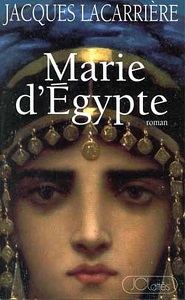
Jacques Lacarrière (2 december 1925 – 17 september 2005)
Cover
De Griekse dichter en schrijver Iakovos Kambanellis werd geboren op 2 december 1922 in Hora op het eiland Naxos. Zie ook alle tags voor Iakovos Kambanellis.
Uit: Die Freiheit kam im Mai (Vertaald door Elena Strubakis)
„Wir fahren seit Tagesanbruch in Güterwaggons. Es ist stockfinster. Die meisten von uns haben bereits vierzig Tage Einzelhaft und ebenso vier Monate in einem kleinen Lager in der Nähe von Simmering verbracht. Dort war auch ein Jude gewesen. Die SSIer hatten einen offenen Kreis um ihn gebildet und ihm zugeschrien: „Ball!” Der Jude hatte zu laufen begonnen, vom einen zum anderen, und sie hatten ihn gegen die Beine, in den Bauch, in die Rippen, gegen den Kopf getreten. Das Fußballspiel hatte geendet, als der „Ball” im Schlamm aus Erde und Blut reglos liegen geblieben war. Als sie es überdrüssig geworden waren, jeden Tag dasselbe Spiel zu spielen, ertränkten sie ihn in einem Fluss, der von Kanälen gespeist wurde. Der Zug, in dem wir transportiert werden, hält in vielen Stationen. Die anderen Waggons sind reguläre Waggons. Aus demselben Zug steigen Reisende aus. Andere steigen ein. Sie sprechen leise und wir drücken die Ohren an die Wände. Wir hören Gespräche solcher Art: Eine Frau: „Sag der Helga, dass sie sich nicht um den Schirm sorgen soll.” Ein Mann: „Habe ich das Restgeld von der Theke genommen? Ah ja, hier ist esl” Ein anderer Mann: „Habt ihr noch anderes Gepäck?” Ein anderer Mann: „Das ist alles, danke.” Ein anderer Mann: „Halt, mein Herr! Mein Name ist Gandert… Gute Reise!” Eine andere Frau: „Helmut, verkauf mich nicht für dumm…” Der Mann: „Unsinn, am Sonntag werde ich zurück sein.” Wir hören alle Anweisungen und die Pfiffe der Bahnhofsvorsteher, aber wir verstehen weder, wo wir sind, noch, wohin wir fahren. Wir halten wieder. Sie entriegeln die Schiebetüren und öffnen sie. Es ist noch Tag. Die Sonne scheint uns direkt ins Gesicht und blendet uns. Aber besser so. Die Station ist klein, provinziell, umgeben von Bäumen, abgeriegelt von der der SS. Der Offizier ersucht die Reisenden, die aussteigen, schnell weiter zu gehen. Und er ersucht jene, die bereit dazu sind, in den Zug zu steigen, ein wenig zu warten. Die Übernahme durch die SS von Mauthausen erfolgt namentlich. Wir stellen uns in Fünferreihen auf.“
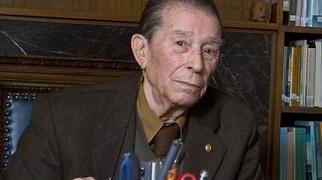
Iakovos Kambanellis (2 december 1922 – 29 maart 2011)
De Amerikaanse schrijver Eric L. Harry werd geboren op 2 december 1958 in Ocean Springs, Mississippi. Zie ook alle tags voor Eric L. Harry op dit blog.
Uit: Pandora: Outbreak
“The sound of the zipper on Emma Miller’s tent woke her with a start. Cold air flooded in. Backlit in dim starlight she saw a man, his breath fogged. Her heart raced as she fumbled for her flashlight … and found her pistol. “Who’s there?” She flicked the light on. It was the blond Russian soldier who had saved her life hours earlier. His pupils were black and unresponsive. “Stop!” He said nothing. She kicked at him. “Stop-stop!” He crawled atop her. She dropped the flashlight while flicking the pistol’s safety off. Barn! In the flash, his head rocked back with a hole in his brow. Sgt. Sergei Travkin collapsed heavily onto Emma’s shins. “Oh-my-God!” A knife stabbed her tent and sliced it open. Men hoisted Emma—whimpering before she thought to hold her breath—into the shockingly cold air. The ever sober young scientist loosed an animal sound. “Noon! Nor’ Someone wrenched from her grip the pistol Travkin had given her after being infected. The pistol with which she had killed him. Emma’s sobs merged with her shivering. Anonymous men clad in personal protective equipment unzipped her blue jeans and yanked. Goosebumps sprang from bare thighs. A bright lantern blinded her. Her jeans snagged at each ankle. “St0000p!” she screamed. “P-Please!” Buttons popped off her blouse. “Wait!” An ugly knife sliced through the front of her bra. She covered her breasts. Gloved fingers found the elastic of her panties. She clamped her knees together and stooped in a futile attempt at modesty. Her teeth clenched against an overpowering chatter. She shook from the cold, from the shock of killing a man and from the incapacitating terror at what may lie ahead. “Would … somebody … ?” Frigid spray stung her midriff. She doubled over with a grunt. Three men in gowns, hoods, boots, and gloves sprayed disinfectant through a wand, pumped a cylinder like an exterminator, and scrubbed her roughly with a brush at the end of a telescoping pole. She willed herself to stand upright, raising quivering arms and turning circles in place, as soldiers rolled Emma’s tent into a single biohazard bundle. Travkin’s dilated pupils hadn’t contracted even in the brilliance of her flashlight. Did he infect me? Noxious liquid burned her eyes and fouled her mouth. Despite its awful taste, she swished, gargled, and spat. The pool brush scraped at her hair. She grabbed it and used it to scrub her head and face herself. “He wouldn’t stop!” she shouted before coughing and spitting. He never got closer than my knees. Maybe I’m okay? Soldiers hoisted the impermeable crimson bag, covered in prickly black biohazard symbols, by loops at its corners and carried away her tent, parka, and backpack along with Travkin’s remains. The faint rays of her flashlight shone blood-red through its plastic. Buckets of cold water cascaded over her head. “Jee-zus!” One after another. “Aaaaw!”

Eric L. Harry (Ocean Springs, 2 december 1958)

